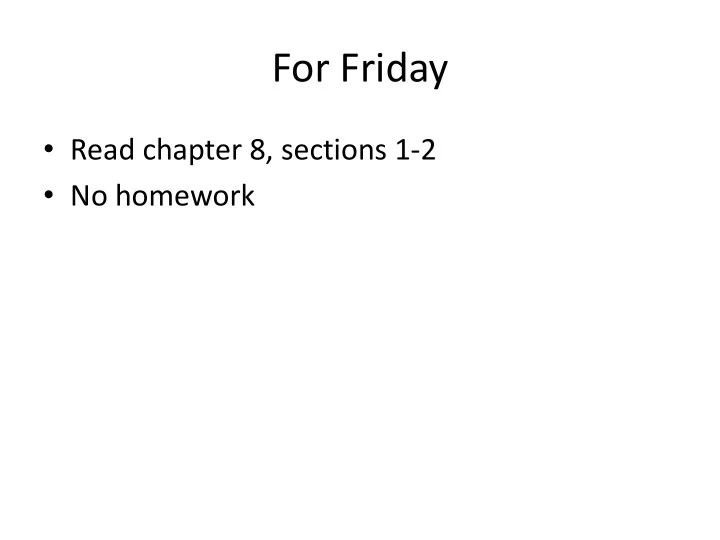

For Friday • Read chapter 8, sections 1-2 • No homework
ILP Homework • Due Monday after Spring Break • Obtain Student Relational data from the UCI ML repository • Use each of FOIL, Golem, and Aleph to learn rules for the data • Each system requires its own data format, you’re going to have to do some data massaging • You may also need to play with some parameters • Turn in the rules developed by each and a brief discussion of the experience and the results
Program 3 • Any questions?
Recursion Limitation • Must not build a clause that results in an infinite regress. – path(X,Y) :- path(X,Y). – path(X,Y) :- path(Y,X). • To guarantee termination of the learned clause, must “reduce” at least one argument according to some well-founded partial ordering. • A binary predicate, R , is a well-founded partial ordering if the transitive closure does not contain R ( a , a ) for any constant a . – edge(A,B) for an acyclic graph 4
Ensuring Termination in F OIL • First empirically determines all binary-predicates in the background that form a well-founded partial ordering by computing their transitive closures. • Only allows recursive calls in which one of the arguments is reduced according to a known well-founded partial ordering. – path(X,Y) :- edge(X,Z), path(Z,Y). X is reduced to Z by edge so this recursive call is O.K • May prevent legal recursive calls that terminate for some other more-complex reason. • Due to halting problem, cannot determine if an arbitrary recursive definition is guaranteed to halt. 5
Learning Family Relations • F OIL can learn accurate Prolog definitions of family relations such as wife, husband, mother, father, daughter, son, sister, brother, aunt, uncle, nephew and niece, given basic data on parent, spouse, and gender for a particular family.
Inducing Recursive List Programs • F OIL can learn simple Prolog programs from I/O pairs. • In Prolog, lists are represented using a logical function cons(Head, Tail) written as [Head | Tail] . • Since F OIL cannot handle functions, this is re- represented as a predicate: components(List, Head, Tail) • In general, an m -ary function can be replaced by a ( m +1)-ary predicate. 7
Example: Learn Prolog Program for List Membership • Target: – member : (a,[a]),(b,[b]),(a,[a,b]),(b,[a,b]),… • Background: – components : ([a],a,[]),([b],b,[]),([a,b],a,[b]), ([b,a],b,[a]),([a,b,c],a,[b,c]),… • Definition: member(A,B) :- components(B,A,C). member(A,B) :- components(B,C,D), member(A,D). 8
Logic Program Induction in F OIL • F OIL has also learned – append given components and null – reverse given append , components , and null – quicksort given partition , append , components , and null – Other programs from the first few chapters of a Prolog text. • Learning recursive programs in F OIL requires a complete set of positive examples for some constrained universe of constants, so that a recursive call can always be evaluated extensionally. – For lists, all lists of a limited length composed from a small set of constants (e.g. all lists up to length 3 using {a,b,c}). – Size of extensional background grows combinatorially. • Negative examples usually computed using a closed-world assumption. – Grows combinatorially large for higher arity target predicates. – Can randomly sample negatives to make tractable. 9
More Realistic Applications • Classifying chemical compounds as mutagenic (cancer causing) based on their graphical molecular structure and chemical background knowledge. • Classifying web documents based on both the content of the page and its links to and from other pages with particular content. – A web page is a university faculty home page if: • It contains the words “Professor” and “University”, and • It is pointed to by a page with the word “faculty”, and • It points to a page with the words “course” and “exam” 10
F OIL Limitations • Search space of literals (branching factor) can become intractable. – Use aspects of bottom-up search to limit search. • Requires large extensional background definitions. – Use intensional background via Prolog inference. • Hill-climbing search gets stuck at local optima and may not even find a consistent clause. – Use limited backtracking (beam search) – Include determinate literals with zero gain. – Use relational pathfinding or relational clichés. • Requires complete examples to learn recursive definitions. – Use intensional interpretation of learned recursive clauses. 11
F OIL Limitations (cont.) • Requires a large set of closed-world negatives. – Exploit “output completeness” to provide “implicit” negatives. • Inability to handle logical functions. – Use bottom-up methods that handle functions • Background predicates must be sufficient to construct definition, e.g. cannot learn reverse unless given append . – Predicate invention • Learn reverse by inventing append • Learn sort by inventing insert 12
Intensional Background • Advantages? • Costs
Issues of Negatives • Negative examples not always available • Closed world assumption may be too restrictive
Output Completeness • Must have specific input/output • Must provide all outputs for each input • Estimating negatives
Decision Lists
GOLEM • RLGG
Alternative Bottom up • LGGs with intensional background – Issue? – Solutions
Hybrid Approaches • CHILLIN • Progol • Aleph
Recommend
More recommend